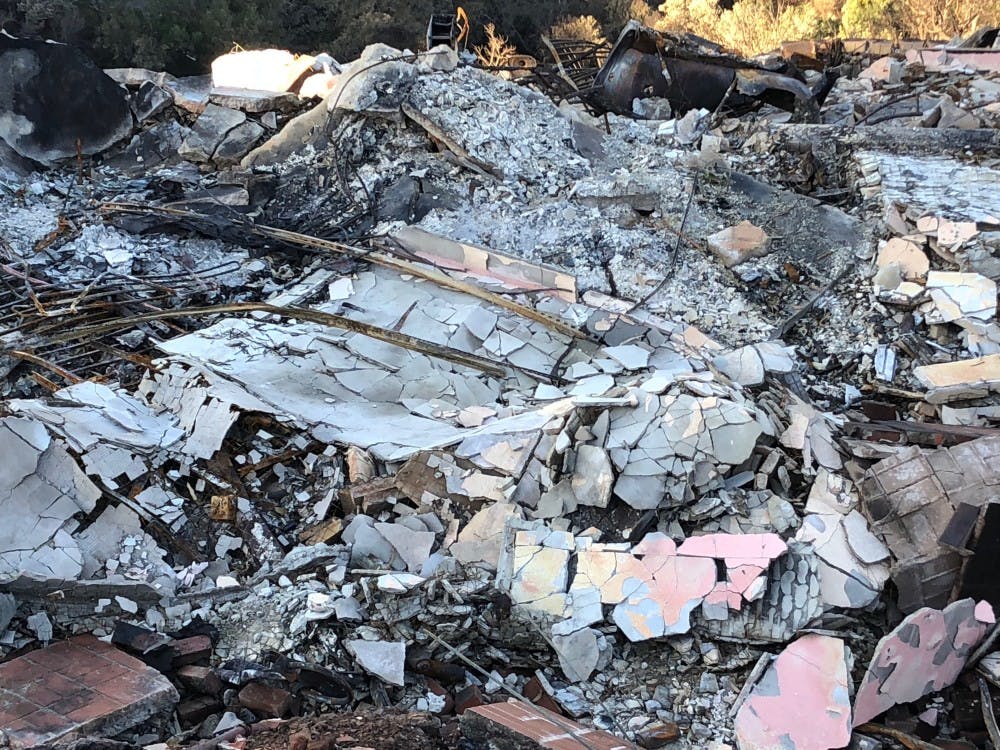Although California may seem very far from us, its problems affect the lives of people on our very campus. The recent California wildfires burned hundreds of thousands of acres of land and displaced more than 25,000 people, including some of the families of University of Richmond students.
Although sophomore Caleigh Wallace’s home in Los Angeles was not directly affected, her family members who live near Paradise had to prepare to evacuate their homes, Wallace said.
Paradise is located about 180 miles northeast of San Francisco. Within one day, the Camp Fire burned down Paradise homes, businesses and restaurants. The Camp Fire was named the most destructive and deadliest fire in the history of wildfires in California. It was also noted as the fifth-deadliest wildfire in the United States.
“Being in Richmond during all of the fires made me feel very far removed,” Wallace said. “I have a few friends in the San Francisco area who could not attend classes during the fires because the air pollution got so bad.”
Another sophomore, Missy Carlson, also heard from friends and family back home in Marin County, which is just north of San Francisco, that people were affected by the resulting air pollution from the wildfires.
“The air pollution is the main effect that the fires have in my county,” she said. “Three times in the past two years, my high school had to cancel school due to bad air quality.”
Junior Reid Bryan, who is currently studying abroad in Scotland, received news from his parents at home that the air quality was so poor that they could not go outside or even let their dog out. Bryan and his family live in Manhattan Beach, which is on the coast and is about 15 minutes south of the Los Angeles International Airport.
“I have a number of friends at UC Berkeley who reported horrible air quality and had classes canceled before Thanksgiving break,” Bryan said. The school was on the verge of shutting down entirely, Bryan said, and according to The Washington Post, it did end up closing.
On Sunday, Nov. 11, Mia Reinoso Genoni, dean of Westhampton College and associate dean of the School of Arts and Sciences, sent an email to students who live in the California area. She wrote to check in with these students after hearing about the catastrophes of the Camp Fire north of Sacramento, the Woolsey Fire in Ventura County and Malibu and the Hill Fire near Thousand Oak. All of these fires collectively killed over 80 people, according to USA Today and The Tribune.
Genoni continued that she hoped the students’ friends and family back home were safe, and that she realized it must be hard to focus on school work during such tragic times.
“We know it can be challenging to concentrate on your classes while you are thinking of and worried about your home,” she wrote. “If that is the case, please reach out to your professors and to us so we can find ways to help.”
Alumna Kirsten Avila, ’18, believes that because there were four different fires occurring throughout California at the same time, many resources were stretched thin and the fire departments were unable to contain the wildfires as quickly as they usually do. Avila, a Malibu native, said the winds and dry air had also contributed to the longer amount of time it took to contain the fires.
Enjoy what you're reading?
Signup for our newsletter
“I live in the canyons, so typically because of fire danger there are at least five fire trucks in every canyon neighborhood, but there were no fire trucks in my canyon during these fires,” Avila said. “All houses have fires hoses, and my neighbors stayed during the fires and literally saved our homes and kept it from spreading. They normally don’t evacuate, but the fires ended up getting so bad that they had to.”
Because police checkpoints were set up on the roads to stop people from returning to Malibu even after the wildfires, people could not leave to gather water, batteries, gas, food and other basic supplies, Avila said. The founder of LNA, a popular clothing brand, ended up bringing supplies to Malibu by yacht, while other locals fetched other needed supplies by jet skis and surfboards, Avila said.
But the aftermath of the wildfires was arguably just as bad as the fires themselves. Carlson heard stories from family back at home of houses being burned down and people not having enough basic necessities to get back on their feet.
“Unfortunately, people not from Malibu or California don’t understand that, after the fire, the worst hasn’t even happened,” Avila said. “Rain hit Malibu and there were a ton of mud slides and Malibu was evacuated last week. It’s been crazy, but this has really brought Malibu and honestly all of California closer together.”
Although the catastrophe still continues in California, many people have been working hard to make the aftermath as painless as possible. Many charity efforts have formed in response to the wildfires, including the One Love Malibu Concert. The concert raised $1 million and featured popular singers such as Katy Perry, Gwen Stefani, Robin Thicke and Natasha Bedingfield, according to the LA Times.
Contact contributor Colby Alvino at colby.alvino@richmond.edu.
Support independent student media
You can make a tax-deductible donation by clicking the button below, which takes you to our secure PayPal account. The page is set up to receive contributions in whatever amount you designate. We look forward to using the money we raise to further our mission of providing honest and accurate information to students, faculty, staff, alumni and others in the general public.
Donate Now



